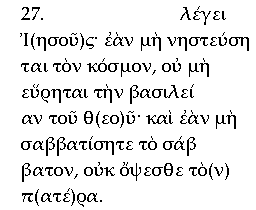Visitor Comments
A degree of withdrawal from the "world" provides the perspective to realize your true place in Reality. Meditation on God (a true Sabbath) is necessary to understanding a part of the Nature of God.
- active-mystic
Be IN the world but not OF the world. It is a schoolroom, not a quasi-utopia. Do not let the things OF the world rule you. Observe the sabbath, that is follow the instructs of your teacher
- Thief37
Yes, I think here what is meant is meditation. Time for contemplation. If you do not have time for reflective thought you will not see.
- Willows
|
Scholarly Quotes
Marvin Meyer writes: "Clement of Alexandria, Miscellanies ('Stromateis') 3.15.99.4, incorporates a beatitude with similar content: 'Those who have castrated themselves from all sin for the sake of heaven's kingdom are fortunate: They are the ones who fast from the world.' Fasting from the world means abstaining from the material things that the world has to offer; keeping the sabbath a sabbath seems to imply that one should rest in a truly significant way and separate oneself from worldly concerns. Thus 'Macarius' of Syria is cited by Aelred Baker ('Pseudo-Macarius and the Gospel of Thomas,' p. 220) as making the same sort of statement: 'For the soul that is considered worthy from the shameful and foul reflections keeps the sabbath a true sabbath and rests a true rest. . . . To all the souls that obey and come he gives rest from these . . . impure reflections . . ., (the souls) keeping the sabbath a true sabbath.' The words 'observe the sabbath as a sabbath' in saying 27 could also be taken to derive from the idiom 'keep the sabbath (in reference to) the sabbath,' as in the Septuagint. Further, since the Coptic employs two different spellings for the word translated 'sabbath' in saying 27 (sambaton and sabbaton), it is conceivable - but probably too subtle - that the text could be translated 'observe the (whole) week as the sabbath'; compare Tertullian, Against the Jewish People 4: 'We ought to keep a sabbath from all servile work always, and not only every seventh day, but all the time.'" (The Gospel of Thomas: The Hidden Sayings of Jesus, pp. 81-82)
Joseph A. Fitzmyer writes: "'Fasting to the world' must mean withdrawal from a worldly or secular outlook; it is an abstention from the world that involves becoming a 'solitary' (monarchos)." (Essays on the Semitic Background of the New Testament, p. 391)
Joseph A. Fitzmyer writes: "Being a construction with a cognate accusative (lit., 'to sabbatize the sabbath'), it explains the peculiar Coptic construction, where the repeated word is really superfluous, etetntmeire mpsambaton ensabbaton. (The dissimilation of bb to mb in the first occurence of the word in Coptic, but not the second, should be noted.) The Greek expression occurs in the LXX at Lv 23:32; 2 Chr 36:21. C. Taylor (op. cit., pp. 14-15) showed that it does not simply mean 'to observe the (weekly) sabbath'. In Lv 23:32 it refers to the Day of Atonement, which is to be kept as a real sabbath. Hence, it is likely that we should understand the expression in this saying in a metaphorical or a spiritual sense. Cf. Heb 4:9 and Justin (Dial. w. Trypho 12, 3; PG 6, 500), who uses sabbatizein in the sense of a spiritual sabbath opposed to the formal Jewish observance; for him it consisted in abstention from sin." (Essays on the Semitic Background of the New Testament, p. 392)
Gerd Ludemann writes: "A literal understanding, namely sabbath observance, is to be excluded. Rather, 'sabbath' here may be synonymous with 'world'. In that case v. 2 symbolizes abstinence from worldly values. For 'seeing the Father' cf. Matt. 5.8 ('see God')." (Jesus After 2000 Years, p. 604)
M. A. Williams writes: "In the Gospel of Thomas, Jesus says, 'If you do not fast with respect to the world, you will not find the Kingdom' (saying 27). But another saying in that gospel (14) seems to reject external acts of piety, including fasting, as things that can lead to sin, possibly because of pride or hypocrisy. The fasting 'with respect to the world' in saying 27 could therefore be intended as a metaphor for general withdrawal from involvement in the world (which itself implies other forms of ascetic denial). It is possible that it is not fasting per se which is rejected in saying 14 of Gos. Thom. but only hypocritical or empty fasting, which does not reflect a genuine indifference to the world." (Rethinking "Gnosticism", p. 142)
F. F. Bruce writes: "This saying (whose Greek text is preserved in P. Oxy. 1. 2) seems to have been widely known in the church of the second and third centuries; its substance appears in Justin, Clement of Alexandria and Tertullian. [Justin, Dialogue with Trypho 12.3; Clement, Miscellanies iii. 99.4; Tertullian, Against the Jews 4.] While literal fasting and sabbath-keeping are deprecated (cf. Sayings 14, 104), the spiritual counterpart to these religious exercises is recommended (cf. Saying 6)." (Jesus and Christian Origins Outside the New Testament, p. 125)
|

